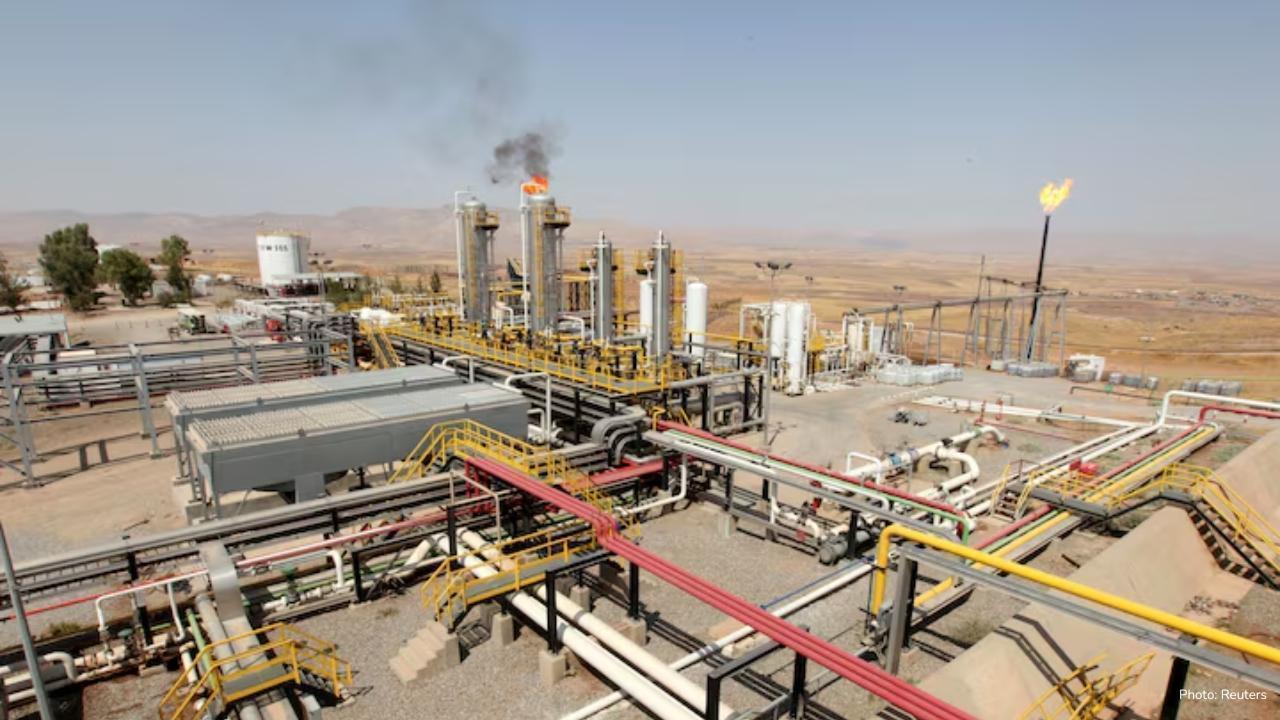
Post by : Monika
Oil prices dropped on Monday following two important developments in the global energy market. These include the resumption of crude oil exports from Iraq’s semi-autonomous Kurdistan region and plans by the OPEC+ alliance to increase oil production in the coming months.
These developments are significant because they affect the global supply of crude oil, which in turn impacts prices, economies, and energy security worldwide.
Resumption of Kurdistan Oil Exports
Crude oil exports from Iraq’s Kurdistan region restarted over the weekend after a break of more than two years. This resumption comes after a deal was reached between Iraq’s federal government, the Kurdistan Regional Government (KRG), and foreign companies that operate oil fields in the region.
Under the new agreement, the oil will flow through the pipeline that runs from Kurdistan to Turkey’s Ceyhan port, with initial exports of around 180,000 to 190,000 barrels per day (bpd). In the future, this figure could increase to 230,000 bpd. The United States had supported this agreement, seeing it as a way to stabilize oil supplies globally and ensure that the market has enough crude to meet demand.
The suspension of exports in the past had caused economic difficulties in Kurdistan, particularly affecting government services and public spending. The halt was triggered by a ruling from the International Chamber of Commerce, which ordered Turkey to pay Iraq $1.5 billion for unauthorized exports of Kurdish oil.
Under the new agreement, Iraq’s state oil company SOMO will manage the exports, while Kurdish producers will receive $16 per barrel. This arrangement aims to resolve financial disputes and provide steady income for both the federal government and the Kurdistan region. It is also expected to ease tensions between Baghdad and the KRG, which have sometimes affected political stability and oil production.
OPEC+ Plans to Increase Oil Production
At the same time, the OPEC+ alliance—which includes countries such as Saudi Arabia, Russia, Iraq, and other oil producers—has announced plans to increase oil production. The group is expected to approve an increase of at least 137,000 barrels per day during its upcoming meeting on October 5, 2025.
This decision comes after several months of production adjustments. Since April, OPEC+ has already increased quotas by more than 2.5 million bpd, though actual output has often lagged due to capacity limits among some members. Some countries are not able to produce as much as they are allowed because of maintenance issues, aging oil fields, or political and economic constraints.
The planned increase in production is partly influenced by pressure from the United States and other consuming nations, which want to ensure that oil prices remain affordable. OPEC+ decisions are always closely watched because they affect global supply and can influence the cost of fuel, transportation, and goods worldwide.
Oil Price Movements
As a result of the resumption of Kurdish exports and the expected OPEC+ output increase, oil prices fell modestly. On Monday, Brent crude futures dropped by 43 cents, or 0.6%, to $69.70 per barrel, while U.S. West Texas Intermediate (WTI) crude fell by 49 cents, or 0.8%, to $65.23 per barrel.
Despite the declines, prices remain relatively strong compared to earlier periods this year when Brent briefly fell below $60 per barrel. Analysts suggest that while more supply from Kurdistan and OPEC+ may weigh on prices, other factors such as geopolitical tensions and limited production capacity continue to support market stability.
Turkey-Iraq Relations: The resumption of Kurdish oil exports requires cooperation between Iraq and Turkey. Past disputes had interrupted the flow of oil, showing how diplomatic and economic issues can affect the global energy market.
Global Demand Uncertainty: The recovery of the global economy, changes in energy consumption, and shifts toward renewable energy sources can influence oil prices.
OPEC+ Coordination Challenges: Even when OPEC+ agrees to raise production, some members may face challenges in meeting their quotas. This includes issues like technical capacity, domestic consumption priorities, or political constraints.
These factors make oil markets sensitive to both supply and demand developments. Investors and analysts must monitor events closely to understand how prices may change.
Kurdistan Export Agreement: Economic Implications
The resumption of exports is important not only for global oil prices but also for the economy of Kurdistan. For years, halted exports led to budget shortages, reduced government spending, and limited public services. By restarting oil shipments, the KRG will receive revenue that can fund hospitals, schools, infrastructure projects, and social programs.
The agreement also helps Iraq’s federal government by ensuring that the central oil company, SOMO, manages the sales, preventing conflicts over control and revenue. It is expected to bring a more predictable and transparent system for selling Kurdish oil, which will benefit both domestic and foreign investors.
OPEC+ Output Increase: Global Impact
However, analysts caution that output increases may not fully materialize if member countries face technical or political limitations. This means that supply could still be tight, keeping prices supported.
Oil Market Analysis
Challenges and Risks
Despite the positive steps taken, there are risks to market stability:
Looking Ahead
The coming weeks will be important for the oil market:
Oil markets are experiencing a delicate balance of supply and demand. The resumption of Kurdish exports provides much-needed supply to global markets, while OPEC+ plans to increase output aim to prevent sharp price rises.
Oil prices have dipped slightly due to these developments, but they remain supported by ongoing geopolitical risks and production constraints. The combination of increased supply, coordinated production strategies, and regional cooperation will play a key role in maintaining stability in global energy markets.
For Kurdistan, the restart of oil exports brings economic relief and revenue to fund public services. For OPEC+ members, increasing production helps maintain market share and ensures that global demand can be met.
Investors, governments, and energy companies will continue monitoring these developments closely. The upcoming OPEC+ meeting and the continued flow of Kurdish oil are likely to influence oil prices, economic planning, and energy strategies worldwide.
while short-term price fluctuations are expected, the combination of supply increases and careful management by producers aims to create a stable and predictable oil market for the months ahead.
Oil prices Brent crude WTI crude










Sinner & Swiatek Shine at China Open: Semifinal Spots Secured
Jannik Sinner and Iga Swiatek advance to the semifinals at the China Open. Read about their victori

Michigan church attack kills 4, injures 8 in shocking violence
A gunman drove into a Michigan church, fired shots, set fire, killing 4 and injuring 8 before police

Moldova’s Pro-EU Party Secures Majority in Key Vote
Moldova’s pro-European PAS wins a strong majority in the parliamentary election, weakening pro-Russi

Gabriel’s late header gives Arsenal 2-1 win at Newcastle
Arsenal snatch dramatic 2-1 win at Newcastle as Gabriel heads the winner in stoppage time; Merino eq

Air France Flight 447 Trial Opens 16 Years After Tragic Crash
Sixteen years after the Air France Flight 447 crash, a trial opens against Air France and Airbus. Le

Europe close to Ryder Cup win after strong weekend play
Team Europe is on the verge of winning the Ryder Cup, showing great form in Italy and needing only a